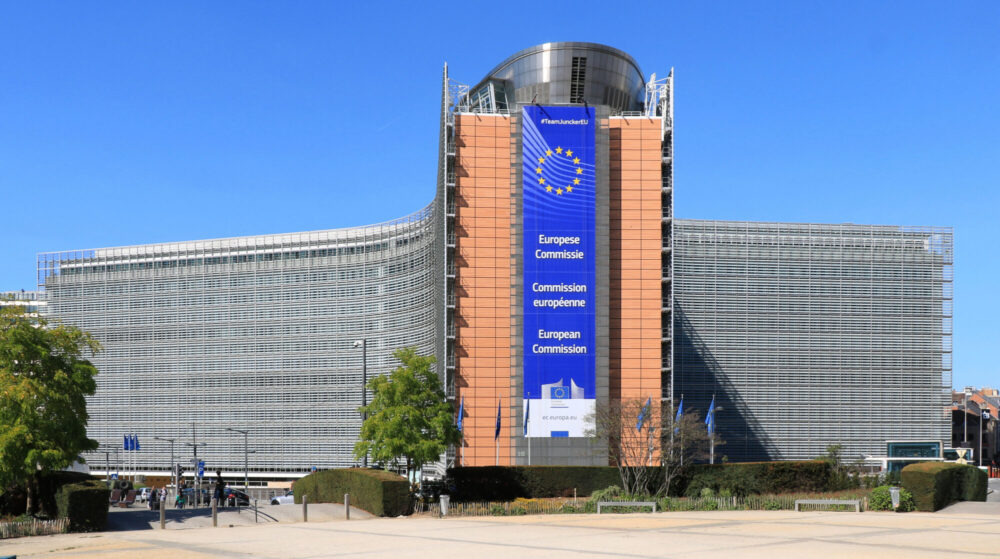
EmDee, CC BY-SA 4.0, via Wikimedia Commons
The European Commission has channeled billions of euros in public funds to finance NGOs and think tanks that, far from acting independently, have served as instruments to promote its political agenda. This is revealed by a newly published report from MCC Brussels titled The Commission’s Propaganda by Proxy, unmasking programs such as the Citizens, Equality, Rights and Values (CERV) one that aims to consolidate pro-EU narratives while marginalizing critical voices.
The report denounces the way in which the European Commission allocates funds to NGOs aligned with its values and objectives. “The Commission funds organizations that are economically dependent on its grants and that act as spokespersons for its agenda,” the document states, highlighting a clear distortion of civil society’s traditional role. It also criticizes the Commission itself, which, as an executive body, has evolved into an ideological entity in recent years, moving away from its original role of mere political management for which it was created.
Among the cited examples is the financing of the Young European Federalists (JEF), which has received more than 1.2 million euros between 2021 and 2025 to mobilize young people in favor of European federalization. Another case is the European Policy Centre (EPC), a think tank that has received nearly 30 million euros in the last decade and openly advocates for greater supranational integration.
One of the main mechanisms used by the Commission is the CERV program, with a budget of 1.5 billion euros. Officially, this fund is intended to “strengthen democracy and rights in the EU,” but in reality it finances a series of projects with clear propagandistic aims. Among the cases quoted in the report is the RevivEU project, managed by the EUROPEUM Institute for European Policy, which aims to “combat eurosceptic narratives promoted by autocratic elites” in the Visegrád countries (Hungary, Poland, Czech Republic, and Slovakia). This project received 645,000 euros between 2023 and 2024.
Another paradigmatic case is the Hold on to Europe project, funded with 27,500 euros, whose objective is “to increase citizens’ interest in the EU and the need for greater integration.” These initiatives demonstrate that, under the pretext of “promoting European values,” the Commission is pushing a strategy of indoctrination financed with public money.
The report also highlights cases where these funds have been used to interfere in the internal politics of certain member states. In countries governed by eurosceptic parties, such as Poland and Hungary, the Commission has funded opposition NGOs against democratically elected governments.
In the case of Hungary, the Ökotárs Foundation received 4 million euros in 2022, despite the government of Viktor Orbán identifying it as a “distribution center” for foreign money intended to weaken his administration. The Hungarian government has repeatedly said that Brussels’ soft power not only influences the politics of non-EU countries but also those of the very member states of the Union.
In Poland, the Commission has funded various NGOs active in protests against the previous conservative government, including the Res Publica Foundation, which received funds to “counter democratic backsliding.”
One of the report’s most concerning aspects is the lack of transparency in the allocation of these funds. According to the document, “oversight of these resources is minimal, and the Commission grants them without the involvement of national authorities.” In fact, a 2018 European Court of Auditors audit had already warned about the “lack of information on the final destination of public money.”
The report highlights the urgent need for greater transparency and accountability in the allocation of public funds and for a review of the EU’s funding mechanisms to ensure they do not become a tool for covert propaganda. As the report rightly points out, European citizens deserve to know how their money is being spent and whether it is truly being used to defend democracy or to impose a political agenda.
This strategy of selective funding raises serious doubts about the Commission’s impartiality and whether it is genuinely promoting democratic values or simply consolidating its own power at the expense of member states’ sovereignty. Furthermore, it calls into question the role of many NGOs that, far from acting as true civil society representatives, have become tools of a supranational bureaucracy.
Using the EU budget to finance a network of like-minded organizations is a practice that undermines pluralism and democracy in Europe. Instead of fostering an open and diverse debate, the Commission promotes a unilateral agenda funded by European taxpayers.
